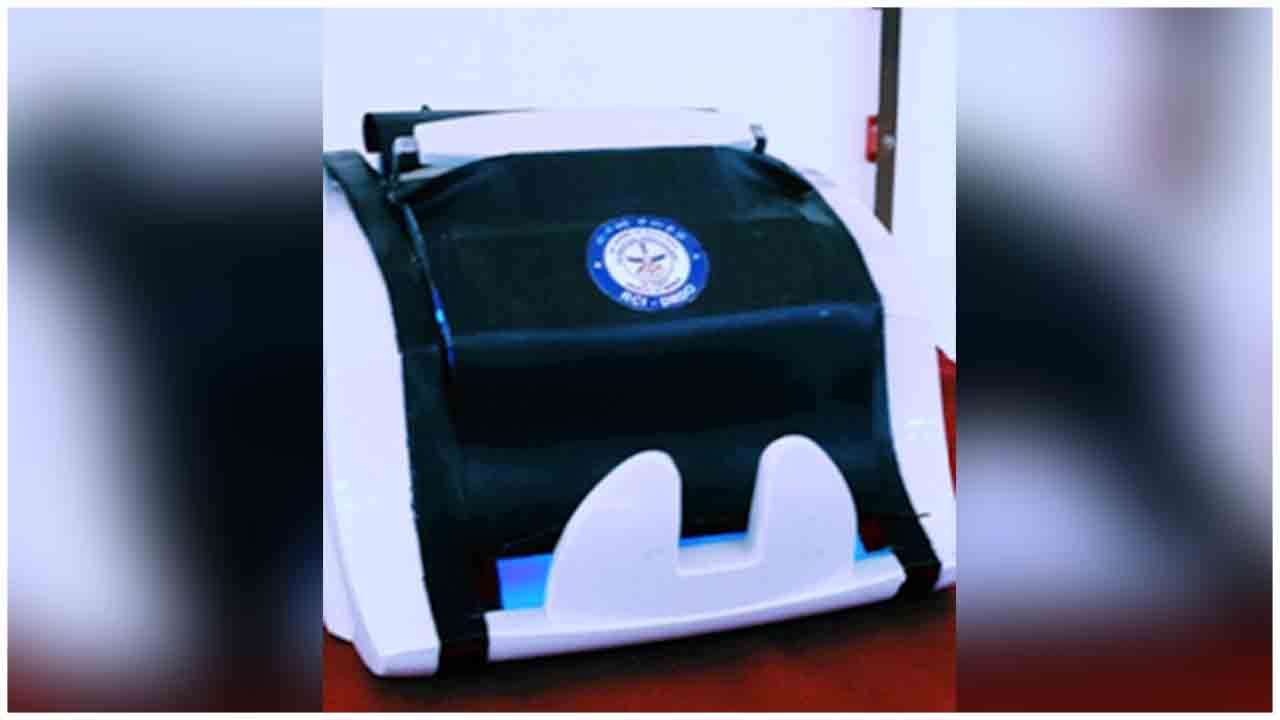Hyderabad based Defence Research and Development Organisation (DRDO) premier lab, Research Centre Imarat (RCI), has developed an automated contactless UVC sanitisation cabinet, calledDefence Research Ultraviolet Sanitiser (DRUVS). It has been designed to sanitise mobile phones, iPads, laptops, currency notes, cheque leafs, challans, passbooks, paper, envelopes, etc.
The DRUVS cabinet is having contactless operation which is very important to contain the spread of virus. The proximity sensor switches, clubbed with drawer opening and closing mechanism, makes its operation automatic and contactless. It provides 360 degree exposure of UVC to the objects placed inside the cabinet. Once the sanitisation is done, the system goes in sleep mode hence the operator need not wait or stand near the device.
The RCI has also developed an automated UVC currency sanitising device, called NOTESCLEAN. Bundles of currency notes can be sanitised using DRUVS, however disinfection of each currency notes using it will be a time consuming process. For that purpose, a sanitising technique has been developed, where one has to just place the loose currency notes at the input slot of the device. It picks the notes one by one and makes them pass through a series of UVC lamps for complete disinfection.
In another techno update,to urgently develop safe and effective Biomedical solutions against SARS CoV-2, Department of Biotechnology and Biotechnology Industry Research Assistance Council (BIRAC) had invited applications for COVID-19 Research Consortium. In addition, BIRAC has also created a provision to fund COVID-19 solutions that are ready for immediate deployment under a ‘Fast Track Review Process’.
Under the research consortium, DBT and BIRAC have continuously been evaluating applications with an intent to support Industry/ Academia and Jointly Academia & Industry for developing Diagnostics, Vaccines, Novel Therapeutics, Repurposing of Drugs or any other intervention for control of COVID-19. Through a rolling multitiered review mechanism, 70 proposals of devices, diagnostics, vaccine candidates, therapeutics and other interventions have been recommended for receiving financial support. The shortlisted proposals includes10 Vaccines candidates, 34 Diagnostics products or scale-up facilities, 10 Therapeutics options, 02 proposals on Drug Repurposing and 14 projects which are categorised as preventive interventions
To be able to provide an accelerator approach for vaccine development, DBT has identified institutes which will provide animal models for testing pre-clinical efficacy and also make available neutralization assays. IIT Indore will produce Pseudovirus SARS CoV-2 which can be used for development of in-vitro assays. Enzene biosciences limited will make available Spike protein and Receptor Binding Domain protein in large quantities to vaccine and diagnostic companies as a reagent. The portfolio of vaccine candidates has further been enhanced by providing support for development of Next-generation mRNA vaccine candidate by Gennova and also separately to CMC, Vellore for a lipid encapsulated mRNA based vaccine.
Early development work for developing an Intranasal vaccine candidate for COVID-19 has also been awarded to Indian Institute of Chemical Technology.
University Delhi South Campus has initiated work towards discovering neutralizing antibodies from an existing phage display based library and are being supported under National Biopharma Mission of DBT.
To ensure complete indigenization of COVID diagnostics, support has already been provided to AMTZ and other companies to scale-up production of RT PCR kits. In addition anticipating long term need for diagnostics, DBT/ BIRAC have also committed support for different types of diagnostics platforms like: Fluorescence and Electrochemistry Mediated Rapid Detection of SARS-Cov-2 Nucleic Acid from Bennett University, Greater Noida; portable microfluidics embedded on chip rRT-PCR and microelectrode array coupled point-of care optoelectronic device for large scale screening: JNU, Delhi; Development and evaluation of aptamer based lateral flow assay kit for detection of SARS-CoV2 detection to IIT Delhi and CRISPER based diagnosis of Covid-19 using paper microfluidics form IIT Guwahati. Other companies to get funding support are Denovo, Biolabs, ShineBiotech, Prantae, Proma Therapeutics, Achira. In total, 34 companies and academic institutes will receive financial support for ensuring there is no shortage of indigenous diagnostic kits in the near future.
Department of Biotechnology has also launched a National Biomedical Resource Indigenization Consortium (NBRIC) in a Public Private Partnership model to foster indigenous innovation focused on developing reagents and resources for diagnostics, vaccines and therapeutics for COVID19 which is in partnership with ABLE and CII and is being hosted by C-CAMP.
Under its ‘Fast Track Review Process’ Process BIRAC has created a provision to fund COVID solutions that are ready for immediate deployment. Through this initiative Startups with PPE solutions have been approved for supporting manufacturing of “Full body coverage suits” to Aarna Biomedical Products and for “Face Shields” to Alpha Corpusles Pvt Ltd. Automoted Sanitizer to MicroGO, Remote patient monitoring Stasis Health Pvt Ltd. Turtle Shell for DOZEE a sleep monitoring device, Monitra for remote monitoring of patients, Perisodhana for N-95 Mask’s and Remidio for Ambu bags.

 DRDO, Research Centre Imarat (RCI), has developed an automated contact less UVC sanitisation cabinet, called Defence Research Ultraviolet Sanitiser (DRUVS). It has been designed to sanitise mobile phones, iPads, laptops, currency notes, cheque leafs, challans, passbooks, paper, envelopes
DRDO, Research Centre Imarat (RCI), has developed an automated contact less UVC sanitisation cabinet, called Defence Research Ultraviolet Sanitiser (DRUVS). It has been designed to sanitise mobile phones, iPads, laptops, currency notes, cheque leafs, challans, passbooks, paper, envelopes

































